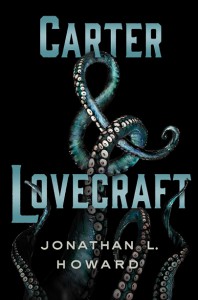Danielle's Reading Adventures
Reading is my favorite hobby, hands down. Books are love to me. I am an avid collector, and paper books will always edge out e-books with me.
Family Legacies

The Early 20th Century writer HP Lovecraft has spawned a whole sub-genre of horror dedicated to his ideas, often called the Cthulhu Mythos or Lovecraftian horror. Not surprising that nearly 100 years later, people are still re-imagining his work and characters. "Carter and Lovecraft" is a different spin on Lovecraft. What if Lovecraft, frankly a huge bigot and racist, had descendants of color and one of them ran a bookshop? What if one of his recurring characters, Randolph Carter, actually existed, and his descendant was a police officer? And they team up in a story? Well, that's this book. Daniel Carter is a detective who has lived through the trauma of his partner killing himself in front of him after they rescue a kid from a serial killer. His last words referring to "the twist". Carter resigns from the police and becomes a private detective. Shortly thereafter, he inherits a bookstore from a person he never knew in Providence, Rhode Island. When he goes down there, he meets Mina Lovecraft, an African American woman who runs the bookstore for her uncle, who disappeared months ago and has been heard from since. Around the same time, Carter is hired on a case that leads to some very strange murders committed by a rogue mathematician. Could all these things be related? Yes. So this is a very strange book. It's relatively short, but there's a lot here to chew on. Howard knows his Lovecraft. This book is full of nuggets and easter eggs for Lovecraftian enthusiasts. I was encouraged to look up some elements of the story, and it gets deep into the Mythos. I think he captured the aspect of Lovecraft in that you feel like you have no idea about what's going on and you probably won't find out. He also touches on the visceral horror that is integral to Lovecraft. In some ways, he develops some aspects of the Mythos better. His characters are more fleshed out and are used as more than devices to spread the feeling of fear and fatalism about an indifferent universe. He picks up some concepts and themes from some of Lovecraft's stories and creates a new story out of them set in the 21st Century. But my favorite part is how Howard subversively dissects Lovecraft's bigotry and racism. Mina is a descendant would have done Lovecraft proud if he could get past his white supremacy and racism. She's thoughtful, intelligent, emotionally stable, well-read, and loyal and very strong. She had a matter-of-fact approach to weirdness, which is enviable, considering some of the events that happen in this family. She seems to be the antidote to Lovecraft's claustrophobic fear of the Other and conviction that some people are just genetically inferior. Daniel Carter is a good co-lead. He's a decent guy. As a cop, he tends to be a skeptic about things, but in the face of weirdness, he doesn't shut down, he follows the lead. I like that he had to confront his own hidden prejudices and comes out a better man after he did so. He does feel at times the helplessness in the face of events beyond their comprehension that is emblematic of Lovecraft's protagonists, but doesn't give into and doesn't allow it to break his mind. There's a developing connection between Carter and Lovecraft, but it's nascent. They become friends, and its likely what they go through will only strengthen that bond. It is possible that things may become romantic over time. But more importantly, they know that they have each others' backs. Of course, there had to be some weird people, because it's Lovecraft. The rogue mathematician, the Waites, femme fatales who are simultaneously sexy but also deeply wrong, and their brain dead spouses, the mysterious lawyer who informs Carter of the bequest. Enough to make any reader feel uneasy about everything. So why the <b>3.5/5.0 star </b>rating? The main feeling I came out of this was "What did I just read?" It feels short to me. It was a book that kept my interest, and I liked the main characters, but I also felt like there was a lot that I didn't get or understand when it ended. There are some gruesome elements to this story and subject matter that made me uncomfortable. This one is not for young readers. Frankly, I was a bit disturbed by some imagery. The rogue mathematician who discovers a way to manipulate reality is a profoundly damaged individual lacking in morals. His acts are unconscionable and bizarrely cruel. To him, murder is manipulating the odds. It's always hard to read about people like this for me. Readers who like having the questions will enjoy this book. I think I would have preferred a longer book that delved a little deeper into those unanswered questions. This is going to be a series, so maybe things will be more fleshed out in later books. I like the main characters and the concept, so I'll keep reading.
 2
2






